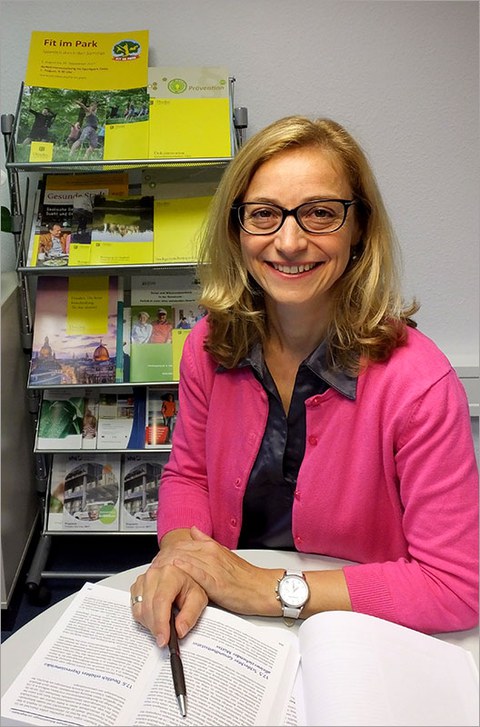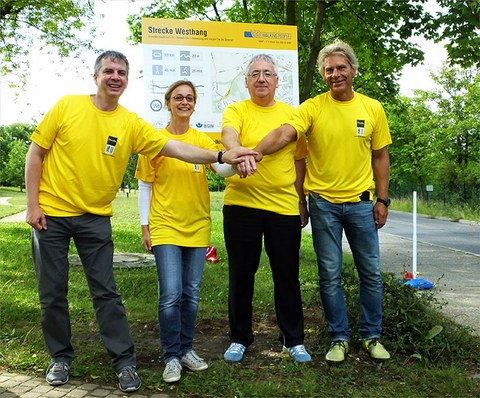Public health: a universal mission
(Interview from 2017)
Dagmar Möbius
Even before graduating from high school, Peggy Looks knew that she wanted to go into social research. Since 2011, the doctor of sociology has been involved in the Dresden "Healthy Cities" project as a WHO representative.
The 43-year-old does not yet feature under the “People” section of her native Meerane’s Wikipedia page, but that could still change. As a representative of the World Health Organization, Dr. Peggy Looks has been promoting not only a healthy Dresden, but "Healthy Cities" in general for six years. Until a year ago, the capital of Saxony was the only German city in the WHO European Healthy Cities Network. Around 80 cities are active in the German "Gesunde Städte" ("Healthy Cities") network.
A project close to her heart

Dr. Peggy Looks is a World Health Organization representative in the Dresden Healthy Cities project.
Peggy Looks went to school in Glauchau in the Ore Mountains, in what is now the district of Zwickau. She had always planned to obtain a university degree. She was interested in social issues, and began studying sociology with minors in psychology and education at TU Chemnitz in 1993. After her Vordiplom intermediate examination in 1995, she switched to a master's in sociology with minors in psychology and education at TU Dresden. "I decided on the move because TU Dresden offered a much broader range of minors," she recalls. In Occupational and Organizational Psychology, she found Prof. Bärbel Bergmann, Prof. Peter Richter, and Prof. Winfried Hacker particularly inspiring; adult education was her favorite aspect of the education course, and Prof. Gisela Wiesner and Prof. Wolfgang Ihbe were her favorite lecturers. She found the training in social science methodology to be particularly innovative. What was more: "Academic standards were high, but teaching was also centered on practice."
Peggy Looks sees what she learned during her degree about teamwork, solving complex problems, and methodology when approaching projects and tasks as a strong foundation for her professional role. However, she recognized that "the social sciences cannot be seen in isolation if we want to understand the complex processes at work in our society and in human coexistence." Her choice of final-year thesis topic was a brave one at the time: As a sociologist, writing her thesis in psychology, she chose the question of East German career paths.
The ideal preparation for working life
One day after her final exam, Peggy Looks started work as a research assistant with Prof. Bärbel Bergmann. "The learning phase was far from over," she laughs and adds, "I acquired many skills that still benefit me today there in that team." In 2000, she got the opportunity to switch to TU Dresden's Faculty of Medicine. "Under Prof. Wilhelm Kirch (†) in the Public Health Saxony research association, I gained an even greater understanding of interdisciplinary work." She felt that her studies abroad at the University of Oulu in Finland, which she completed in 1997, equipped her for international collaboration. It was Professor Kirch who sowed the seeds of Peggy Looks' enthusiasm for public health, which remains to this day. He was her supportive doctoral supervisor at the Faculty of Medicine. She chose Prof. Heiner Drerup from the Faculty of Education as her second supervisor. In 2002, she completed her doctorate on the discharge of long-term patients from Saxony's large psychiatric hospitals – an area she does not often deal with today. For more than eight years, Dr. Peggy Looks then worked as a senior research associate in the "Wissen-Denken-Handeln" research group at TU Dresden with Prof. Winfried Hacker, whose expertise, approach, and skills were an inspiration. Up until 2011, she was responsible for numerous occupational health and safety projects, for example on lifelong learning, maintaining effectiveness in the face of demographic change, and preventive behavioral and structural measures for teachers. Dr. Looks also took a part-time master's degree in economics and management at TU Kaiserslautern between 2007 and 2010 to ensure she also had an understanding of economic processes.

As part of the EU project "Walking People – It's never too late to start," running and exercise routes were set up in various districts of Dresden to encourage locals to go (power) walking and jogging.
USP: dynamic partnerships
Dresden has been an active member of the European "Healthy Cities" network since 1991. When the Saxon capital advertised for someone to manage its Healthy Cities work, Dr. Peggy Looks applied. She has been the WHO 'Healthy Cities' project representative since 2011. The role of her one-woman department is the promotion of community health: health equity, health protection, infection prevention and control, and more. "Of course, all solutions in this area have to be interdisciplinary," says the public health expert. She collaborates with the regional environment agency, is involved with city transportation planning, works with the public health board and the youth welfare office, and participates in numerous working groups. "I'm always involved when it comes to noise abatement or the clean air plan," she says, citing two examples. "The fact that collaboration is so close and effective is something that you will not find everywhere," she stresses. A number of chairs at TU Dresden are also involved in specific, specialist areas. Peggy Looks very much enjoys working with and supporting students on internships and in student research projects. When she needs specialist advice herself, she calls her former colleagues. International engagement and exchange in the WHO European Healthy Cities Network benefit the city and inspire her personally.
Making Dresden (even) healthier
"There is a lot to do," says Peggy Looks with a smile. She wants to help locals become more active and create opportunities for the inactive and socially disadvantaged. She is also committed to supporting healthy, active aging and promoting alternative means of transport. "Preventive healthcare can't just stop at 50," she says. Senior citizens’ walks are already going strong in a number of neighborhoods. There are currently plans to launch another, in Plauen, the same neighborhood as the TU campus. Local residents could and still can name their favorite places and highlights for the project, which are then included in an accompanying booklet. The project received an award from the German Federal Center for Health Education two years ago and is extremely popular – and not only for class reunions. "Fit im Park" ("Fit in the park") is aimed at all age groups. The free, one-hour sports and exercise program is run by trained coaches on public green spaces, and prior registration is not required.
As for Dr. Peggy Looks herself, she runs regularly. She also takes her bike to visit the various city hall offices spread across the city. In her spare time, she works out and hikes. For as she says, "if you don't pursue a healthy lifestyle yourself, how can you promote health in others?"
Contact:
Dr. Peggy Looks
Beauftragte WHO-Projekt "Gesunde Städte"
Landeshauptstadt Dresden
Email
